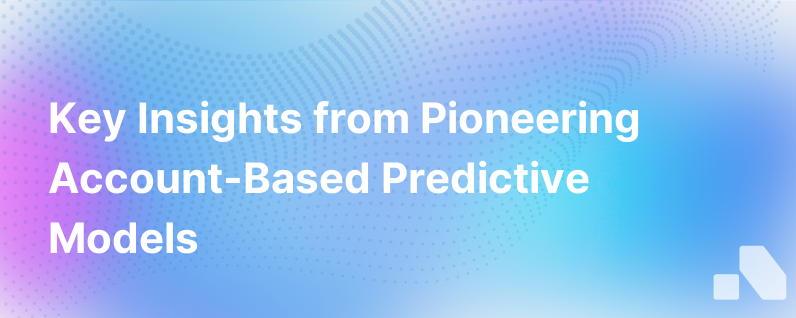
In an ever-evolving B2B landscape, companies must continuously innovate to maintain a competitive edge. Account-Based Marketing (ABM) is one such innovation that has revolutionized how companies target and engage high-value accounts. Building upon this, the integration of predictive modeling techniques is setting a new benchmark for precision and efficiency in sales and marketing strategies. Let's dive into the insights gleaned from pioneering account-based predictive models, a journey that encompasses the synergy of deep data analysis, machine learning, and strategic sales methodology.
The Genesis of Account-Based Predictive Models
The inception of account-based predictive models can be traced to the quest for efficiency and efficacy in sales and marketing. Traditional broad-based approaches are increasingly seen as ineffectual, especially when it comes to B2B enterprise sales. Predictive models enable companies to identify and prioritize accounts with the highest propensity to buy, thereby aligning resources and efforts where they are most likely to yield returns.
Shifting Paradigms: From Reactive to Proactive
A pivotal learning from pioneering predictive models is the transition from a reactive to a proactive stance. Traditionally, sales and marketing initiatives have been largely reactive, where responses are crafted after a prospect has shown interest. Predictive models, however, empower businesses to anticipate and influence buyer journeys before the prospect even enters the sales funnel.
The Multifaceted Benefits for Sales and Marketing
Pioneering firms have learned that account-based predictive models can significantly enhance various aspects of the sales and marketing process:
Enhanced Segmentation and Targeting
Predictive modeling goes beyond basic demographic and firmographic data, incorporating signals like technographic data, intent data, and historical engagements to inform which accounts are ripe for targeting. This rich, multi-dimensional view has taught sales teams to fine-tune their approaches and personalize engagement with high-probability prospects at scale.
Increased Efficiency
Sales efficiency has been one of the greatest benefits. By focusing efforts only on accounts that are predicted to have a higher likelihood of conversion, predictive modeling has allowed sales teams to reduce time wasted on low-yield prospects.
Improved Marketing ROI
Marketing campaigns can now be laser-focused on nurturing the right accounts at the right time with tailored messaging. No longer are marketing dollars spread thinly across an indeterminate audience; they are invested in influencing the accounts identified as most valuable, leading to an improved ROI.
The Symbiotic Relationship with AI
Artificial intelligence and machine learning have become irreplaceable in predictive modeling. The evolution of these models relies on the continuous learning provided by AI algorithms, working with vast datasets and updating predictions in real-time based on engagement and behaviors.
Key Components of Successful Account-Based Predictive Models
The journey towards implementing these models has highlighted several key components for success:
Data is King
The foundation of any predictive model is data. Not just plentiful but high-quality, relevant, and structured data. This goes for both historical data from within the organization and external data from the marketplace and particular account’s digital footprint.
Continuous Refinement
The predictive model is not a set-it-and-forget-it tool. Pioneers in this space are continually refining their algorithms based on outcomes and shifting market dynamics. This iterative process ensures the model becomes increasingly precise over time, adapting to new trends and information.
Cross-Departmental Collaboration
Predictive modeling shines brightest when sales, marketing, and IT teams work together. This collaborative effort ensures that the insights generated are actionable and that strategies are seamlessly integrated across platforms and pipelines.
Embracing a Test-and-Learn Culture
Not all predictions lead to success, and that's okay. Effective use of predictive models involves a culture that understands the importance of learning from both hits and misses. This ethos encourages experimentation and innovation without the fear of failure.
A Glimpse Into the Future
Building account-based predictive models isn't the final destination. It's a journey of perpetual adaptation. We're seeing an exciting trajectory where the integration of even richer data sets, like real-time market events or granular behavioral analytics, continue to refine and empower these models.
Forward-thinking organizations are integrating predictive models into broader customer engagement platforms for holistic management of the customer lifecycle, leveraging predictive insights to facilitate post-sale customer success and retention strategies.
Implementing Predictive Modeling Insights Into Practice
In the end, the most valuable lesson from pioneering account-based predictive models is the crucial need to implement insights into everyday practice. It's not just about having the most advanced technology but about how you use it to empower your sales force, deliver more engaging marketing campaigns, and ultimately drive growth.
Firms that have excelled in this arena have one thing in common: they leverage tools that make predictive insights accessible and actionable for teams. Aomni, for instance, encapsulates this philosophy, delivering real-time account research and personalized sales content that feed seamlessly into an account-based approach.
In conclusion, as we delve into the age of precision marketing and strategic sales, the pioneering journey of account-based predictive models has truly just begun. The learnings amassed thus far lay a significant groundwork that will undoubtedly steer the B2B sector towards unprecedented levels of customer engagement and commercial success.